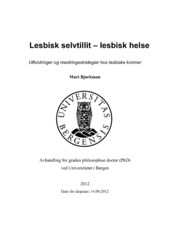| dc.contributor.author | Bjørkman, Mari | en_US |
| dc.date.accessioned | 2012-09-10T12:40:35Z | |
| dc.date.available | 2012-09-10T12:40:35Z | |
| dc.date.issued | 2012-09-14 | eng |
| dc.identifier.isbn | 978-82-308-2101-5 | en_US |
| dc.identifier.uri | https://hdl.handle.net/1956/5996 | |
| dc.description.abstract | Lesbian women make up a sexual minority within a heteronormative society where homosexuality becomes invisible and inferior. Minority stress is the excess stress individuals from stigmatized social categories experience because of their minority position. Stress may influence health and identity. It is not the burden of stress itself that determines its influence on health and identity, but how the individual copes with the stress. Existing research indicates that having a lesbian orientation may be especially challenging in encounters with health care professionals. Consequently, we wanted to explore how minority stress may be experienced by lesbian women in Norway today, and what strategies they employ to cope successfully with these situations. We wanted particularly to learn how minority stress comes into play within the health care system. The objective of this thesis is to develop knowledge that may be applied as a foundation for quality care and improved health for lesbian women, with a special relevance for general practice. We have accomplished three sub-studies based on experiences of lesbian women to illuminate the following issues: 1) What does it mean to lesbian women that the general practitioner is aware of their sexual orientation? 2) What kind of experiences related to sexual orientation do Norwegian lesbian women report from encounters with health care professionals? 3) Which strategies do lesbian women use to cope with challenges related to sexual orientation in their every-day lives? In sub-study I we conducted a focus group interview with lesbian women focusing on when and why it may be important to inform the general practitioner about their sexual orientation. We gathered data in the form of web based histories for substudies II and III. The empirical data consisted of 128 histories about concrete experiences in health care encounters where the lesbian orientation was of importance (II), and 64 histories about successful coping experiences related to the lesbian orientation (III). Data were analyzed with systematic text condensation in all three sub-studies. The analysis was data-driven and supported by theories of heteronormativity (I and II) and salutogenesis and coping (III). The analysis in sub-study I demonstrated that informing the general practitioner about the lesbian orientation may be important in order to be able to be oneself and communicate freely, and it may be relevant for the medical problem at hand. The experiences of the participants constitute a foundation for knowledge about how doctors may support the coming-out process of lesbian women. Sub-study II presents a wide range of experiences among lesbian women encountering health care professionals. The analysis concludes that for health care professionals a persistent awareness that not all patients are heterosexual, a positive attitude to lesbian orientation, and knowledge about lesbian-specific health matters, are required to offer health care services of high quality to lesbian patients. The challenges described by the participants in sub-study III concerned the question of whether or not disclose the lesbian orientation, how to disclose, how to handle derogatory remarks or actions, and how to face homo-negativity within family and other significant relations. Positive coping experiences comprised openness about the lesbian orientation, the way disclosure was carried out, and to maintain dignity when prejudice was encountered. Dignity could be maintained by demanding respect or arguing for rights, or by boosting thoughts and feelings that it is good to be lesbian. The analysis demonstrates that lesbian self-confidence – a personal conviction that a lesbian orientation is equally good and natural as a heterosexual orientation – may be a prerequisite for the positive coping strategies. The thesis presents these main findings: Lesbian women must continually deal with how to appear. Disclosure competency may improve lesbian women’s coping of minority stress related to openness. Lesbian women must continually receive and process reactions from the surroundings. Dignity may be maintained in all situations by sustaining and communicating lesbian self-confidence. Even in Norway 2012 do lesbian women experience minority stress that calls for coping strategies. Lesbian self-confidence may strengthen resilience against minority stress. | en_US |
| dc.language.iso | eng | eng |
| dc.publisher | The University of Bergen | eng |
| dc.relation.haspart | Paper I: Bjorkman M, Malterud K. Being lesbian – does the doctor need to know? A qualitative study about the significance of disclosure in general practice. Scandinavian Journal of Primary Health Care 25(1): 58-62, 2007. Full text not available in BORA due to publisher restrictions. The article is available at: <a href="http://dx.doi.org/10.1080/02813430601086178" target="blank"> http://dx.doi.org/10.1080/02813430601086178</a> | en_US |
| dc.relation.haspart | Paper II: Bjorkman M, Malterud K. Lesbian women's experiences with health care. A qualitative study. Scandinavian Journal of Primary Health Care 27(4): 238-243, December 2009. Full text not available in BORA due to publisher restrictions. The article is available at: <a href="http://dx.doi.org/10.3109/02813430903226548" target="blank"> http://dx.doi.org/10.3109/02813430903226548</a> | en_US |
| dc.relation.haspart | Paper III: Bjorkman M, Malterud K. Lesbian women coping with challenges of minority stress. A qualitative study. Scandinavian Journal of Public Health 40(3): 239-244, May 2012. Full text not available in BORA due to publisher restrictions. The article is available at: <a href="http://dx.doi.org/10.1177/1403494812443608 " target="blank"> http://dx.doi.org/10.1177/1403494812443608 </a> | en_US |
| dc.title | Lesbisk selvtillit – lesbisk helse. Utfordringer og mestringsstrategier hos lesbiske kvinner | en_US |
| dc.type | Doctoral thesis | |
| dc.rights.holder | Copyright the author. All rights reserved | |
| dc.subject.nsi | VDP::Medical disciplines: 700::Health sciences: 800::Health service and health administration research: 806 | eng |

